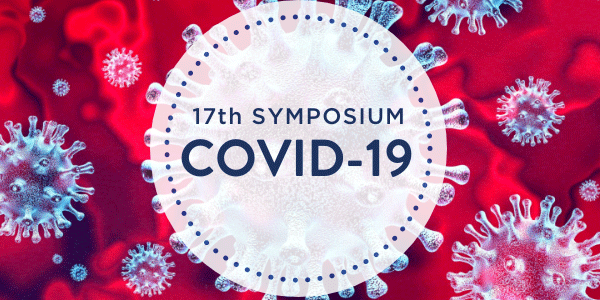NYMC and TCUS Host 17th COVID-19 Symposium
From isolation guidelines, proper mask usage and parenting to disparities in vaccination rates and the commercial real estate market, NYMC and TCUS presented the latest on the pandemic.

The 17th COVID-19 Symposium hosted by New York Medical College (NYMC) and Touro College and University System (TCUS) on January 26, featured NYMC and TCUS faculty who broke down recent changes to federal quarantine and isolation guidelines, mask guidance, racial disparities in vaccination rates, parents’ struggles with the pandemic’s impact on schools and the commercial real estate market in the pandemic.
Hosted by Edward C. Halperin, M.D., M.A., chancellor and chief executive officer of NYMC and provost for biomedical affairs at TCUS, the webinar welcomed guests to what is now the third year of the symposiums. “Whatever the future holds, we’ll keep coming back to you with the latest information that we hope will help you navigate the ongoing pandemic,” Dr. Halperin said.
Marisa A. Montecalvo, M.D., director of health services and professor of medicine, led a presentation focusing on the Centers for Disease Control and Prevention (CDC) isolation guidelines for people infected with COVID-19, called “Five Versus Ten Days, What’s Happening with Isolation and Quarantine.” “I think these changes were put into place to put greater responsibility on the public at large to focus on isolation and restrictions during the period of highest risk but with the public understanding that they will still be responsible for other measures,” Dr. Montecalvo said.
With a new public emphasis on effective mask usage, Robert W. Amler, M.D., M.B.A., dean of the School of Health Sciences and Practice and vice president for government affairs, presented “The Mask Mystique,” describing basic mask-wearing techniques and the antimicrobial properties of copper and silver when infused with masks and its potential use in the future. Dr. Amler also spoke about the preference of N95 masks as opposed to KN95s because N95 masks are more strictly regulated. “In the United States, [KN95 masks] are poorly regulated, if regulated at all,” Dr. Amler said, urging caution when buying KN95 or KF95 masks that may be counterfeit.
Along with proper mask usage, another recurring concern during the pandemic has been the racial disparity in vaccination rates across the U.S. Mill Etienne, M.D. '02, M.P.H., FAAN, FAES, vice chancellor for diversity and inclusion, associate dean of student affairs for the School of Medicine and associate professor of neurology and of medicine presented “What is the Explanation of Continuing Disparities in COVID-19 Vaccination Rate and What Should We Do About It?” He emphasized how health officials must continue to make reliable COVID-19 vaccination information available to diverse communities and underserved populations, who may be hesitant to take the vaccine. “Hesitancy does not mean vaccine refusal, so do not miss an opportunity to educate someone and convince them to get the vaccine,” Dr. Etienne said.
Tami Hendriksz, D.O., FACOP, FAAP, dean and chief academic officer of Touro University College of Osteopathic Medicine in California, tackled the challenges faced by parents who must deal with the everchanging landscape of grade school education amid rising COVID-19 cases among children. Dr. Hendriksz suggested that parents keep children safe by having them vaccinated, upgrading masks, having them tested and coping with stresses by keeping children on routine, controlling COVID-19 information intake and taking time for themselves. “That doom-scrolling that some of us have a tendency to do—it’s time for us to stop that,” she said.
The final presentation by Daniel Shallit, director of Global Store Development for New York City, Long Island and New Jersey, Starbucks and Princi Italian Bakery Real Estate/Development and co-chair of the Real Estate Entrepreneurship Advisory Board, Touro College Graduate School of Business, touched upon the importance of commercial real estate owners or renters to be adaptable and flexible as the real estate landscape fluctuates during the pandemic.
Alan Kadish, M.D., president of NYMC and TCUS, hosted the closing question and answer session including discussions on the effects of vaccines on children, breakthrough COVID-19 infections and attaining proper masks.
